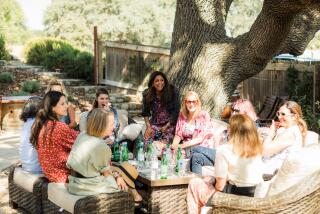Winning Formulas for Broadening Girls’ Horizons in Careers and Travel : Women who’ve succeeded in all kind of careers, from science to the clergy, mention travel as an important factor in bonding with family, learning to be independent and taking risks.
- Share via
Sylvia Rimm, author of “See Jane Win” (Crown, $25), a best-selling book about raising girls for success, remembers when her youngest daughter, Sara, came to her after an argument with two friends. “Mommy,” Sara said, “I told them that girls can be doctors, but they said we have to be nurses.” I can just imagine the smile on Rimm’s face when she replied, “Girls can do everything.”
She would know, because she earned a PhD in clinical psychology while raising four children, two of them girls. Sara is now a psychologist, and Ilonna is a pediatric oncology researcher. With the help of both daughters, Rimm surveyed 1,236 women who described themselves as happy and successful to find out what makes little girls grow up to be accomplished adults. The resulting book identifies formative experiences that the author believes contribute to high achievement, such as reading, studying hard and learning that it’s all right to be different. But what surprised her, Rimm says, was that travel turned out to be the second most-mentioned positive life experience. (Success in competition was the first.)
This doesn’t surprise me, of course. But I was surprised to read in Rimm’s book that women who’ve succeeded in all kinds of careers, from science to the clergy, mention travel as an important factor in bonding with family, learning to be independent and taking risks. I asked Rimm more:
Question: Why has “See Jane Win” been so successful?
Answer: It couldn’t have been written 20 years ago. This is the first opportunity women have had to develop their full selves. To raise daughters during such a changing time is truly exhilarating.
Q: You have four children, all of whom have advanced degrees and families of their own. Did travel play a part in their adult success?
A: With four children, travel was hard. But we did take some very special trips, not necessarily all together. I went with Sara to the Grand Canyon, and later took both girls to Yosemite. There really is a special bonding that goes on during those kinds of trips.
Q: What about when you were a little girl?
A: My parents were immigrants and had very little money. But I did go with a high school group to Israel in 1952, shortly after the establishment of the Jewish state. There were tremendous shortages, and people sacrificed a lot. I’d never seen a country where there wasn’t enough food to put on the table. This had a huge impact on me. A girl like me, brought up in a small industrial town in New Jersey, thinks that’s the way life is everywhere. . . . But going to Israel gave me a totally different perspective.
Q: You say in your book that even though travel requires sacrifice, it’s worth it. Why?
A: Bonding is a part of it, but for one of the women in the book, travel with her family was more about the adventure of seeing different places. When you transfer that to the world of business, it’s a matter of willingness to take risks, which can be hard for women. Also, in travel there are seeds of careers. Miriam Kane, the rabbi mentioned in the book, talked about how her father gave her a sense of spirituality through the awe he felt when the family visited Mt. Rushmore.
Q: But it’s difficult for parents to give girls enough independence to travel, isn’t it?
A: Girls tend to be more overprotected from travel experiences than boys do. We’ve got to find a way to give them that experience while still keeping them safe.
Q: Many women I talk to are amazed that I don’t mind traveling alone. In your book, you report that the majority of successful women surveyed highly valued being alone.
A: A lot of them felt different and lonely at some point during their youth but developed strength from it. When you get to be the president of a corporation, you’ve got to be strong because it’s lonely at the top. When a girl’s self-concept is constantly tied to what other people think of her, she’ll do all kinds of things to fit in instead of finding her own identity.
Q: I get the feeling that there are boy trips and girl trips, and wish that girls got to take the ones boys generally go on.
A: We took our girls camping, but they were also Girl Scouts, which gave them the opportunity to see women managing without men. In Scouts, they learned how to take care of themselves in the outdoors and found strong leadership models in women.
Q: Sometimes my mother and father went on trips by themselves, but they shared their experiences with slide shows and souvenirs.
A: Parents need to get away together. It sends a message to children that they love each other. And sharing their experiences is a great motivator. It makes kids think, “It’s nice to grow up and do these things. I’ll have to wait, but someday I’ll do them too.”
More to Read
Sign up for The Wild
We’ll help you find the best places to hike, bike and run, as well as the perfect silent spots for meditation and yoga.
You may occasionally receive promotional content from the Los Angeles Times.






